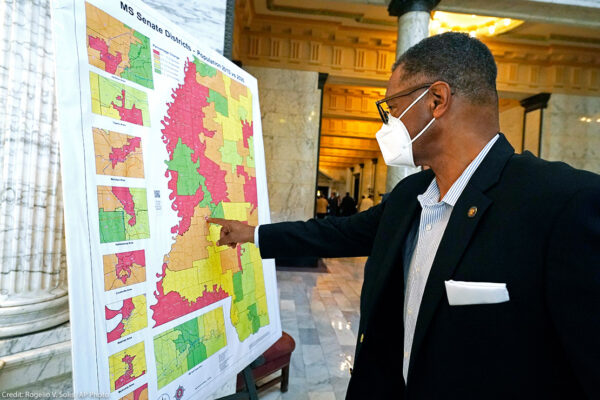Federal Court Orders Mississippi’s State Legislative Maps to Be Redrawn
Court finds 2022 redistricting plan unlawfully dilutes voting strength of Black Mississippians
JACKSON, Miss. — A federal court has ordered Mississippi to redraw its 2022 state legislative maps in several areas after concluding those maps unlawfully dilute the voting strength of Black Mississippians.
Civil rights advocates challenged the maps and showed at trial that the maps violate Section 2 of the Voting Rights Act. Plaintiffs presented extensive expert testimony and testimony from Black Mississippians from across the state to show that the political process in the challenged legislative districts was not equally open to Black voters.
The American Civil Liberties Union, ACLU of Mississippi, Lawyers’ Committee for Civil Rights Under Law, Morgan, Lewis & Bockius LLP, Mississippi Center for Justice, and civil rights attorney Carroll Rhodes filed the lawsuit on behalf of the Mississippi State Conference of the NAACP and voters from across the state.
The court ruled that multiple new Black-majority districts should have been created — at least two in the state Senate and one in the state House. In the absence of Black-majority districts, stark racial polarization, combined with the history of racial discrimination in the state and other factors, deprives Black voters in the state of the right to participate equally in the political process, in violation of Section 2.
The ruling, issued last night, requires the creation of new Black-majority Senate districts in the areas around DeSoto County in Northern Mississippi and in and around the city of Hattiesburg, and a new Black-majority House district in Chickasaw and Monroe counties.
The following reactions are from:
Ari Savitzky, senior staff attorney with the ACLU’s Voting Rights Project: “This ruling is a win for Black Mississippians. The 2022 maps illegally prevented Black Mississippians from fully and fairly participating in our democracy in places like DeSoto County, Hattiesburg, and Chickasaw County. The court correctly found that the Voting Rights Act demands more.”
Jarvis Dortch, executive director of the ACLU of Mississippi: “The court rightly held that the Mississippi Legislature used the redistricting process to dilute the power of Black voters. Those legislative districts denied Black Mississippians an equal voice in state government.”
Charles V. Taylor, Jr., executive director of the Mississippi State Conference NAACP: “The Mississippi State Conference NAACP is pleased with the decision of finding some of the districts discriminatory to Black voters, although we wish the court had gone further.”
Jennifer Nwachukwu, senior counsel at the Lawyers’ Committee for Civil Rights Under Law Voting Rights Project: “This is an important victory for Black Mississippians to have an equal and fair opportunity to participate in the political process without their votes being diluted. This ruling affirms that the voices of Black Mississippians matter and should be reflected in the state Legislature.”
Rob McDuff, director of the Impact Litigation Initiative at the Mississippi Center for Justice: “This ruling brings us much closer to the goal of ensuring that Mississippi has a fair number of majority Black legislative districts to go along with the majority White ones.”
The lawsuit, Mississippi State Conference of the NAACP v. State Board of Election Commissioners, was filed in U.S. District Court for the Southern District of Mississippi.
The ruling is .





